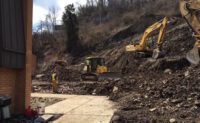Pittsburgh, often-cited as one of the world’s most livable cities, has tainted water and a water utility that critics say has been slow to fix it.
The authority had included water treatment of water with orthophosphate as an interim solution until its water line replacement program could catch up.
Now, under fire for the pace of its lead pipe remediation, the Pittsburgh Water and Sewer Authority will spend $50 million to replace privately owned small-diameter service lines as well as the authority's own. PWSA recently agreed to the program under a settlement of a rate case with state utility regulators reached on Feb. 6.
The deal was brokered a week after Pennsylvania Attorney General Josh Shapiro (D) filed criminal charges against the PWSA, claiming it botched a lead pipe replacement effort in 2016 and 2017.
“The people of Pittsburgh have been drinking lead-contaminated water for too long. This settlement requires aggressive , affordable solutions to protect public health and hold officials accountable to the people they serve… These hard-fought changes would not have been possible without the leadership of Pittsburgh United’s Our Water Campaign and the residents who stood alongside them,” says Dimple Chaudhary, an attorney with Natural Resources Defense Council.
Pittsburgh United, a coalition of faith-based, environmental and labor groups which was represented by lawyers for the council and the Pennsylvania Utility Law Project, intervened in the Public Utilities Commission case against the PWSA.
“Safe water is a right, not a luxury,” says Jennifer Rafanan Kennedy, executive director of Pittsburgh United. “Recent lead level testing confirms Pittsburgh has a chronic lead problem.”
According the NRDC analysis of Environmental Protection Agency data, Pittsburgh is the second-largest water system in the nation to have exceeded the EPA’s action level for lead. PWSA serves bout 80,000 customers in homes and businesses in and around PIttsburgh.
In the past, PWSA had admitted civil liability in the case and was fined $2.4 million by state environmental regulators. The authority had included treatment of water with orthophosphate as an interim solution until its water line replacement program could catch up.
A spokesman for the authority said that it had surpassed PWSA's lead-line replacement mandate in 2018.
To be sure, the numbers are high. PWSA replaced 2,050 lead service lines, equal to 7.5 miles of pipe. It conferred with homeowners at 2,400 pre-construction meetings. PWSA distributed over 10,000 lead test kits and 2,600 lead water filters and pitchers.
But this apparently failed to satisfy water safety advocates and the state attorney general as the authority sought another rate increase.
PWSA is contesting the recent charges filed by Shapiro.
The charges claim PWSA violated Pennsylvania’s Safe Drinking Water Act and include 161 counts. According to Shapiro, PWSA was obligated under state law to take actions to begin to fix lead levels above 15 parts per billion that were found in the city water in 2016 but failed to do so. Those steps included replacing 7% of service lines by June 2017; notifying customers at least 45 days before line replacements, due to an expected temporary rise in the risk of lead exposure; and also, the collection of samples from the replaced lines, to determine their lead content within 72 hours of the new pipes being installed.
Failure to Notify To Customers Cited
PWSA admitted it failed to provide many residents with advance notice of replacement of lines. The authority also “acknowledged it had not collected water samples from those same residences with new pipes within 72 hours of installation,” Shapiro says.
Under the rate case settlement, PWSA's total annual user charge revenues for water service increases by about $16.4 million a year, or 17.1%, and the total annual user charge revenues for wastewater conveyance rises about $4.4 million a year, or 7.2%.
In addition to its small-diameter water line replacement programs, PWSA's capital program includes construction of an orthphosphate treatment facility.
Since exceeding the action level for lead in drinking water in June 2016, the authority stated on its website, "we have been working to aggressively replace lead service lines." Replacing every lead service line will take years, the authority stated. For now, "an effective solution to address high lead levels is to use the most effective corrosion control," referring to the orthophosphate, because it "benefits our entire drinking water system."






Post a comment to this article
Report Abusive Comment